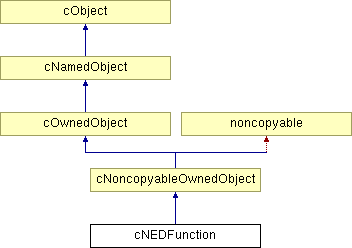cNEDFunction Class Reference
[Internal classes]
Registration class for extending NED with new functions. More...
#include <cnedfunction.h>

Public Member Functions | |
Constructors, destructor, assignment | |
| cNEDFunction (NEDFunction f, const char *signature, const char *category=NULL, const char *description=NULL) | |
| virtual | ~cNEDFunction () |
Redefined cObject member functions. | |
| virtual std::string | info () const |
Member access. | |
| cNEDValue | invoke (cComponent *context, cNEDValue argv[], int argc) |
| NEDFunction | getFunctionPointer () const |
| const char * | getSignature () const |
| char | getReturnType () const |
| char | getArgType (int k) const |
| int | getMinArgs () const |
| int | getMaxArgs () const |
| bool | hasVarArgs () const |
| const char * | getCategory () const |
| const char * | getDescription () const |
Static Public Member Functions | |
| static cNEDFunction * | find (const char *name) |
| static cNEDFunction * | get (const char *name) |
| static cNEDFunction * | findByPointer (NEDFunction f) |
Detailed Description
Registration class for extending NED with new functions.
Objects of this class are usually created via the Define_NED_Function() macro.
Constructor & Destructor Documentation
| cNEDFunction::cNEDFunction | ( | NEDFunction | f, | |
| const char * | signature, | |||
| const char * | category = NULL, |
|||
| const char * | description = NULL | |||
| ) |
Constructor.
Signature is expected in the following syntax: returntype name(argtype argname,...), where types can be bool, long, double, quantity, string, xml, any; names of optional arguments end in '?'. The object name will be the function name, as extracted from the signature string. The signature may end in an ellipsis, i.e. "...", to mean that any number of extra args of unspecified types should be accepted. (When there are both optional args and an ellipsis, then extra arguments can only be passed when all optional arguments are all supplied.)
Examples: "quantity uniform(quantity a, quantity b, long rng?)" "string sprintf(format, ...)" "any max(...)"
Member Function Documentation
| static cNEDFunction* cNEDFunction::find | ( | const char * | name | ) | [static] |
Finds a registered function by name.
Returns NULL if not found.
| static cNEDFunction* cNEDFunction::get | ( | const char * | name | ) | [static] |
Finds a registered function by name.
Throws an error if not found.
| const char* cNEDFunction::getCategory | ( | ) | const [inline] |
Returns a string that can be useful in classifying NED functions, e.g.
"trigonometric".
| NEDFunction cNEDFunction::getFunctionPointer | ( | ) | const [inline] |
Returns the function pointer.
Do not call the function directly, because that would bypass argument type validation.
| int cNEDFunction::getMaxArgs | ( | ) | const [inline] |
Returns the maximum number of typed arguments (i.e.
the last max-min args are optional). If hasVarArgs() is true, the function actually accepts more than getMaxArgs() arguments.
| int cNEDFunction::getMinArgs | ( | ) | const [inline] |
Returns the minimum number of arguments (i.e.
the number of mandatory arguments).
The documentation for this class was generated from the following file:
 1.6.3
1.6.3